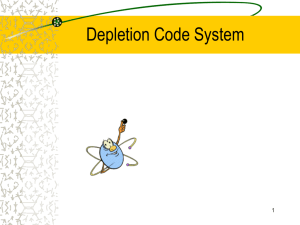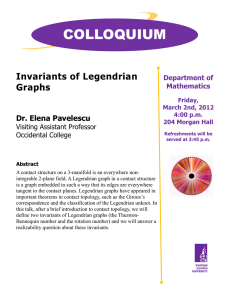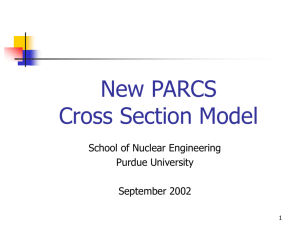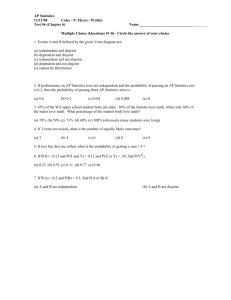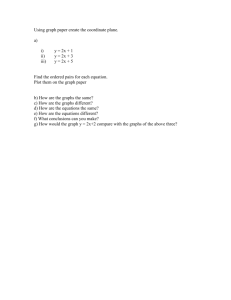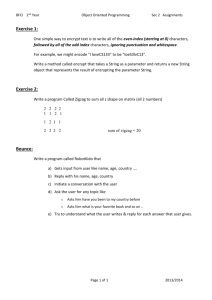Recognizing String Graphs in NP Marcus Schaefer Eric Sedgwick
advertisement
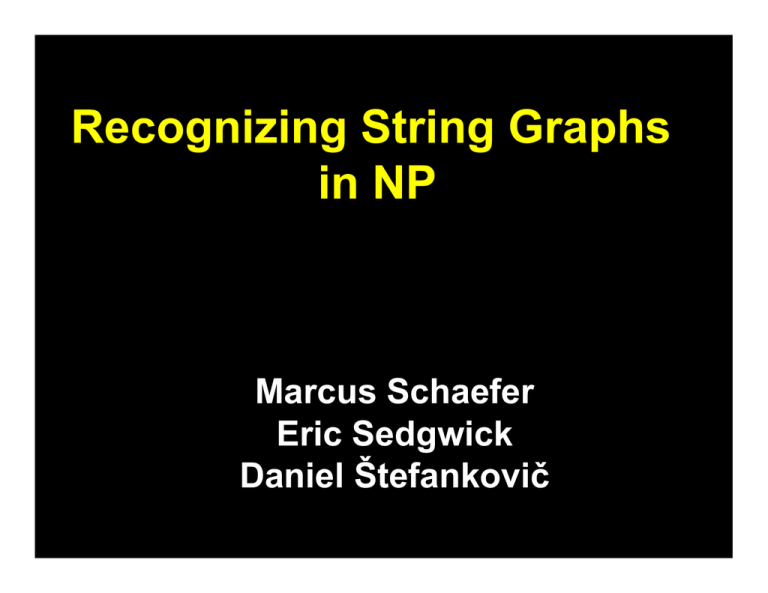
Recognizing String Graphs
in NP
Marcus Schaefer
Eric Sedgwick
Daniel Štefankovič
Identification des graphes
de corde dans NP
(Recognizing String Graphs in NP)
Marcus Schaefer
Eric Sedgwick
Daniel Štefankovič
The origin of the problem
Sinden 1966
Topology of Thin Film RC Circuits
1
2
3
4
1 2 3 4
X
X
X
X X
X
X
X X X
String Graph
G=
Is G an intersection graph of
a set of curves in the plane?
1
2
3
4
1 2 3 4
X
X
X
X X
X
X
X X X
String Graphs
Planar graphs are
string graphs
(Sinden, 1966)
Recognizing string
graphs is NP-hard
(Kratochvíl, 1991)
Recognizing string
graphs is decidable
(in NEXP)
(Pach, Tóth, 2000;
Schaefer, Š, 2000)
Weak realizability
G=
Can G be drawn in the plane ?
• red edge may intersect green edge
• red edge may intersect orange edge
• no other pair of edges may intersect
String
Weak realizability (Matoušek, Nešetřil, Thomas‘88)
Weak realizability
Input:
• Graph G
• set R of pairs of edges
Output:
Is there a drawing of G in the plane such
that only pairs from R may intersect?
(e.g. R=0 corresponds to planarity testing)
Weak realizability
NP-hard (Kratochvíl ‘91)
NEXP (Pach, Tóth ‘00; Schaefer, Š ‘00)
Theorem: If there is a drawing realizing
(G,R) then there is a drawing with at
m
most m2 intersections where m is
the number of edges of G.
The Theorem is tight (Kratochvíl, Matoušek ‘91)
How to encode the witness?
edge
properly embedded arc (parc)
isotopy rel endpoints = continuous
deformations not moving endpoins
Intersection number i(α,β) of
two parcs α,β
min{|a b| ; a C(α), b C(β)}
(set of curves isotopic to α)
Lemma:
On an orientable surface any collection
of parcs can be redrawn so that any two
parcs α,β intersect at most i(α,β) times.
The proof of weak realizability
• encode the properly embedded arcs
(up to isotopy)
• for each pair α,β not in R check i(α,β)=0
Encoding the parcs
1) A triangulation T of M
Encoding the parcs
2) Normalization of the parc w.r.t. T
Encoding the parcs
3) Compute normal coordinates
1
0
1
2
2
Encoding the parcs
Parcs having the same normal
coordinates are isotopic rel boundary.
y
4
3
z
x
5
x+y=3
x+z=5
y+z=4
Encoding the parcs
4
3
5
4
3
5
Encoding the parcs
Is it polynomial ?
construct a weak realizability problem
including the triangulation and use
Theorem: If there is a drawing realizing
(G,R) then there is a drawing with at
m
most m2 intersections where m is
the number of edges of G.
Word equations
xayxb=axbxy
a solution
x=aaaa
y=b
x,y – variables
a,b - constants
Word equations with given lengths
xayxb=axbxy
|x|=4
|y|=1
The size of the bit
representation of
the numbers counts
to the size of the input
Word equations
NP-hard
in PSPACE (Plandowski ’99)
Word equations with given lengths
in P (Plandowski, Rytter ’98)
the lexicographically smallest solution
given by a straight line program
Coloring components of a curve
normal coordinates – can encode any embedded
collection of closed curves and parcs (=curve)
x+y=a
x+z=b
y+z=c
Coloring components of a curve
normal coordinates – can encode any embedded
collection of closed curves and parcs (=curve)
colors occuring
on (u,v)
u
X u,v
y u,t
y t,v
triangle t
| X u,v | = α(u,v)
w
v
for edges from T
M equation X u,v = a, b, ...
The proof of weak realizability
• encode the properly embedded arcs
(up to isotopy)
• for each pair α,β not in R check i(α,β)=0
Do coordinates of α encode a parc?
Are parcs α, β isotopically disjoint?
• check that both α, β are parcs
• color one component of α+β by “b”
• They are disjoint iff the component
is either α or β
Are parcs α, β isotopically disjoint?
• check that both α, β are parcs
• color one component of α+β by “b”
• They are disjoint iff the component
is either α or β
β
α
Are parcs α, β isotopically disjoint?
• check that both α, β are parcs
• color one component of α+β by “b”
• They are disjoint iff the component
is either α or β
α+β
Consequences + other results
pairwise crossing number
NP
existential theory of diagrams
(topological inference) NP
A
B
C
A intersects B
B intersects C
A is disjoint from C
weak realizability on different surfaces
Can be done in NP?
